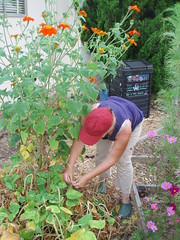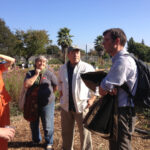A future that is …
Post-petroleum
Socially just
More fulfilling
… ???
In an article which is unfortunately no longer available online, Don Hall (at one time part of Transition Colorado) wrote that “sustainability” wasn’t exactly an enticing goal; that to him it sounded like a deadened eventual destination. His example: “How is your relationship with your spouse?” “Um … it’s sustainable …” Hall advocated for the excitement of ongoing innovation. Perhaps this is akin to the flexible balance and continuous evolution we see in natural systems.
The future won’t look the way it used to. And it won’t look like “green” corporate jobs with steady salaries that auto-pay to your mortgage. It’s much more likely to look like a village full of small proprietors:
Elliott trades chicken eggs, Christine knits socks. Kitty and Carol grow vegetables with compost made by Gene, and Kevin harvests honey.John and Jerry build more gardens, while Julian builds water barrels from found materials that Larry scavenged.Robert guides teams in building from earth and other locally-available materials.Meanwhile David repairs and rebuilds bicycles.
We’ll turn to Hannah and Linda for healing herbs and to Mary Pat for guidance as we care for our elders.Steve, Carolyn and Jocelyn keep art and music alive in our lives.Edgar facilitates the council circle of “governance,” and Peter bakes bread as he listens to your troubles.
Formal degrees and certifications in these skills will likely be irrelevant; most of these adaptation-dependent creative abilities were learned through apprenticeship and in-the-trenches explorative experience. We’ll know via community word-of-mouth who is able and dependable.
There will probably be few U.S. dollars in our pockets. We may carry markers for several different local area currencies, each with a specific purpose. We may participate in multiple informal sharing arrangements. Several of us will have lost our homes so we now double-up in housing. We participate in group purchasing to reduce the costs of those few things that we do buy from other communities.
Some people within our neighborhood might still long for the ways of the past, when the airport was roaring and cars zipped us anywhere we could imagine. But others of us will focus instead on what we have gained: meaningful work, a sense of contentment, and a deep connection with each other and with this specific geography we call home.


